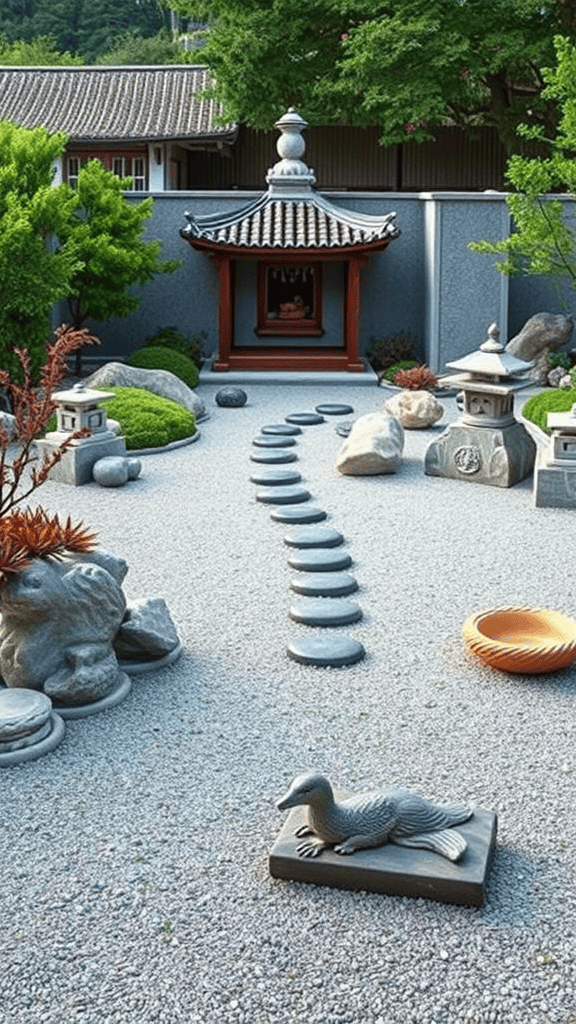Exploring the Symbolism of Different Elements in a Zen Garden
Zen gardens, often known as karesansui or dry landscape gardens, have been cherished for centuries for their serene beauty and deep symbolism. Each element in a Zen garden serves a purpose and carries a specific meaning, contributing to the overall tranquil atmosphere. Understanding these elements can enhance your appreciation of the garden’s design and the philosophy behind it.
Rocks
Rocks are the backbone of any Zen garden. They can symbolize strength, permanence, and resilience. Each stone placed in the garden represents a mountain or an island, evoking feelings of stability. When you look at the arrangement of rocks, you might notice that they aren’t randomly scattered. Instead, they are thoughtfully positioned to create a sense of harmony and balance.
Placement Significance
The way rocks are placed can reflect various themes, such as:
- Mountains: Tall stones remind us of great heights and aspirations.
- Islands: Smaller stones in a sea of white gravel often symbolize solitude and enlightenment.
Gravel or Sand
Gravel or sand fills the spaces between rocks and is an essential part of a Zen garden. Raked into patterns, it represents water, allowing you to visualize how rivers or oceans maneuver through landscapes. The act of raking itself can be a meditative process, helping to clear the mind.
Creating Patterns
When you rake patterns into the sand, you create fluid lines that mimic the movement of water. This not only enhances the visual appeal but also provides a calming action that allows you to connect with the garden’s essence. Common patterns include:
- Straight lines: Representing calm waters.
- Curved lines: Suggesting the gentle flow of rivers.
Moss
Moss is often used in Zen gardens to create lush green areas that contrast beautifully with the gravel. It symbolizes growth, renewal, and nature’s resilience. The color green is associated with tranquility and peace, and having moss in your garden can promote a soothing atmosphere.
Seasonal Changes
Moss reflects the garden’s changing seasons. As it thrives in different climates, it teaches us the value of adapting to change. Watching the moss transform throughout the year can inspire feelings of patience and acceptance.
Water Features
While not all Zen gardens contain water features, when they do, they often represent tranquility and life. Water can symbolize purity, cleansing, and renewal. Whether it’s a small pond or a trickling stream, the presence of water can foster a sense of peace and connection to nature.
Placement Ideas
If you choose to include water in your Zen garden, consider its placement. It can:
- Enhance the soundscape, adding a soothing background of trickling water.
- Create reflections that provide a sense of depth and calm.
Plants
Plants also play a crucial role in the aesthetics and symbolism of a Zen garden. Often, soft textures and simple shapes are preferred. Plants symbolize life and growth. Using evergreens can represent stability and endurance, while flowering plants can symbolize the beauty and transience of life.
Choosing the Right Plants
When selecting plants for a Zen garden, consider options like:
- Bamboo: Represents strength and flexibility.
- Pine Trees: Symbolize longevity and resilience.
Bridges and Pathways
Bridges and pathways in a Zen garden symbolize a journey or transition. They are not just functional but can also serve as metaphors for life’s journey. Walking through these paths invites reflection, allowing you to connect with your surroundings and inner self.
Designing Pathways
A well-designed pathway should:
- Encourage slow, mindful movements.
- Encircle key elements, inviting exploration of the garden.
By exploring the various elements found in Zen gardens, you can appreciate not only their beauty but also their deep symbolic meanings. Each feature contributes to a sense of calm and encourages mindfulness, helping you create a peaceful retreat in your own space.
The Role of Zen Gardens in Promoting Mindfulness and Relaxation
Zen gardens, often characterized by their simplicity and beauty, play a significant role in promoting mindfulness and relaxation. These carefully designed landscapes invite you to pause, reflect, and immerse yourself in the present moment. But what exactly makes a Zen garden so effective in fostering a state of tranquility?
The elements in a Zen garden are not just for decoration; each component holds symbolic meaning. You might see rocks, water features, sand, and plants, each serving a purpose that contributes to a meditative experience.
Understanding the Core Elements
Let’s explore the primary components of these serene spaces and what they represent:
- Rocks: Often seen as the foundation of the garden, rocks symbolize strength and stability. Their placement can reflect various landscapes, such as mountains or islands. Over time, they embody the idea of permanence in a world of change.
- Sand and Gravel: The raked lines in the sand mimic waves or ripples in water, encouraging you to focus your mind. This act of raking promotes mindfulness as you concentrate on the movement of your hands. It symbolizes the flow of time and the essence of life.
- Water Features: Water represents calmness and clarity. Many Zen gardens include small ponds or water basins to invite peace. The sound of running water can be soothing and often serves as a reminder of the flow of life.
- Plants: Zen gardens typically feature minimal plant life, promoting simplicity. Selected plants may symbolize different aspects of nature, such as resilience or renewal. Their presence invites a deeper appreciation for the beauty of nature.
- Bridges and Pathways: These elements encourage you to journey through the garden, inviting introspection and exploration. They symbolize the transitions and passages you experience in life.
The Meditative Benefits
Engaging with a Zen garden promotes mindfulness techniques that are beneficial for both your mind and body. Here are a few ways that spending time in such a space can enhance relaxation:
- Focus on the Present: The design and experience of a Zen garden encourage you to pull away from distractions and immerse yourself in the moment. This dedication to presence can quiet an overactive mind.
- Stress Reduction: The aesthetic beauty of a Zen garden has calming effects. Natural landscapes stimulate your senses positively, reducing stress levels and promoting a sense of wellbeing.
- Mindful Reflection: The visual and tactile elements engage your senses, allowing you to reflect on thoughts and feelings. This practice encourages emotional clarity and deeper self-understanding.
- Physical Activity: Maintaining a Zen garden can involve raking sand or arranging rocks, which promotes physical activity. Engaging in these tasks can be meditative in itself, allowing your body to work while your mind relaxes.
- Cultivating Patience: Creating and maintaining a Zen garden requires time and care. This process cultivates patience, teaching you to appreciate gradual changes rather than immediate results.
Zen Garden Principles in Daily Life
You don’t need an expansive Zen garden to experience the benefits. By integrating similar principles into your life, you can create a personal space for mindfulness. Consider the following:
- Create a small corner: Even a small space with a few rocks and a plant can serve as your Zen area.
- Practice mindful raking: Use sand or gravel in a tray to practice the calming act of raking.
- Walk mindfully: Even simple walks in nature can encourage mindfulness. Focus on each step and the sensations around you.
- Reflect regularly: Set aside time each day to sit in stillness, reflecting on your thoughts and feelings.
Zen gardens offer a pathway to mindfulness and relaxation, helping you reclaim focus in a fast-paced world. By understanding the elements and fostering these practices, you can invite a sense of tranquility into your daily life. Embrace the lessons of a Zen garden and discover the ease of living in the moment.
Conclusion
Understanding the significance of each element in a Zen garden is not just about aesthetics; it unlocks a deeper connection to nature and the mind. The carefully arranged rocks, gravel, and plants each convey messages that resonate with harmony and balance. By incorporating these symbols into your own space, you can create a personal sanctuary that encourages contemplation and peace.
Zen gardens serve as powerful tools for mindfulness and relaxation. When you take the time to engage with the structured simplicity of a Zen garden, you open doors to deeper meditation. The act of raking gravel into soothing patterns can ground you in the present moment, allowing distractions to fade away. This experience is not just beneficial for your mental state; it can enhance your overall well-being.
By understanding the meanings behind the elements—whether it’s the symbolism of the water features representing purity or the rocks symbolizing strength—you find yourself more attuned to your thoughts and feelings. Each visit to a Zen garden can help you cultivate inner peace and clarity, fostering a state of relaxation that’s often hard to achieve in our fast-paced world.
Embracing the elements of a Zen garden invites you to slow down and reflect. It encourages a mindful approach to life, reminding you that even the smallest details can hold significant meaning. As you integrate these practices into your routine, you will discover that the calm and tranquility you cultivate within the garden can radiate through your everyday life, offering a sanctuary amid the chaos.

